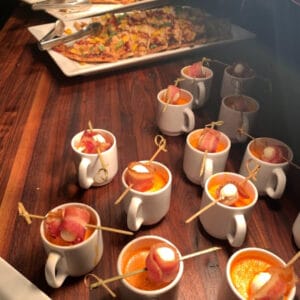
By: Chelsea Radford, ASU Sustainable Food Systems graduate student.
Have you ever worked in a restaurant and noticed the amount of waste produced daily? The endless cycle of taking bag after bag of trash to a dumpster at the end of each night? Well, Steve Short noticed and decided he could do something about it. In December of 2022, the Sustainable Food Systems master’s students at ASU were lucky enough to taste Atlasta’s delicious creations when they catered an event during the Food and Farm Immersion course in Arizona.
Steve Short is the COO and Executive Chef of Atlasta Catering and Event Concepts in Phoenix, Arizona, where he grew up. You don’t have to look too far to see where his inspiration to work with food comes from. Steve’s dad was a chef at Crazy Ed’s Satisfied Frog restaurant in Cave Creek, Arizona, and went on to start his own catering company. Steve grew up surrounded by the food industry; he said, “If I wanted to see my dad, I had to go to work. It became my daycare.”
Steve’s passion for food led him to culinary school, but he still wasn’t sure what he would do with this degree. Eventually, his dad retired, and Steve saw the opportunity to purchase his catering company. It wasn’t always Steve’s driving passion to make Atlasta a company focused on sustainability. He says when he first purchased the company from his father, the main goal was to “become the biggest catering company in the city.” However, this is no longer Steve’s goal.
At the beginning of Steve’s time running Atlasta, things were going well; they had some signed contracts, and there was revenue. Then came the recession, which he describes as the most challenging period in his and his family’s life.
During all this, Steve, his wife Kristine, and their kids went to California for an annual trip and some much-needed relaxation. On this trip, Steve found himself in a bookstore, where he grabbed Stirring it Up: How to Make Money and Save The World by Gary Hirshberg on a whim. The book was about sustainable and organic foods; to Steve, it was incredibly thought-provoking. He was inspired and dead set on reframing his company through a lens of sustainability.
Thus begins the transformation of Atlasta into a highly sustainable food company. When Steve returned from California, he met with a man at ASU named Colin Tetreault, who was incredibly knowledgeable and passionate about sustainability.
After chatting with Colin, Steve quickly realized that this sustainability transformation would not be easy. They had to make simplicity and sustainability the only options for themselves and their staff. Removing all choices that are not sustainable would keep them on track to achieve their goals. Colin and Steve mapped out a 25-year sustainability plan and decided to begin with trash. They integrated sorting stations for recycling and hand-washed and delivered everything possible to recycling centers. Steve says he was surprised that the “human being” part was the easiest because people love structure and to feel they have a purpose. This sustainable model gave people that purpose.
It took nearly six and half years, but as it stands today, Steve and his team only produce around 300 pounds of trash a week across all four restaurants he now owns. Compare that to a more traditional restaurant that produces, on average, around 1,900 pounds of trash each week.
Over the years and with incredible work and diligence, Steve’s goals for Atlasta have shifted from being just about revenue and success. He now focuses more on these philosophies of sustainability that he has come to believe in.
This blog is part of a series from the December 2022 Arizona immersive component of the MS in Sustainable Food Systems Program. Students toured the state, meeting with farmers, ranchers, entrepreneurs, government staff, and non-profit leaders.
